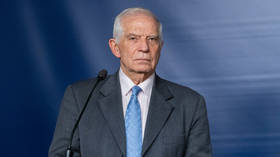ROAR: Russian Opinion and Analytics Review, May 19

In Tuesday’s ROAR we look at oil markets and how the global economic crisis may shift trends in it. The fate of the US air base in Kyrgyzstan is also in focus.
On Monday, China launched the construction of its part of the Eastern Siberia – Pacific Ocean (ESPO) oil pipeline, which is to become one of the main routes of delivery of Russian hydrocarbons to the country, reports Vremya Novostei. The pipeline will be more than 950 km long and is scheduled to be completed in a year and a half. Once in operation, it will pump 15 million tons of crude to China, and the volume may be increased later.
The pipeline is part of China’s strategy to secure crude for its rapidly growing oil processing industry. By 2011 Beijing plans to have six new refineries and eight oil chemistry plants. The supply the Asian country has now is far from being sufficient. It produces some 180 million tons of crude annually on its own soil and imports a similar amount. The main importer now is Saudi Arabia, but in the future Russia may try and take the title from the sheikhs.
The big issue is the cost of the project, which is now estimated at $12.7 billion, but Beijing is willing back it with its financial reserves accumulated in the times of thriving export. China loaned Russian companies Rosneft and Transneft about $25 billion, so that they could go on with their part of the project.
Russia is not the only country receiving Chinese money for future crude supply, as a report in Vedomosty business daily shows. It has already provided credit for Kazakhstan, and now Brazil’s Petrobras may take $10 billion for supplying 200 thousand barrels to China daily, although when deliveries are to start has not been determined.
In times of crisis, China, with its plentiful cash reserves has become a partner of choice for producers of raw materials, the newspaper notes. The Chinese government expects crude oil consumption to reach 405 million tons per year by 2011, so spending its dollar reserves on long-term contracts is a wise choice now.
The oil market has become more or less stable, but the price may tumble soon after Iraq comes in on June 1, warns the business supplement to Rossiyskaya Gazeta newspaper. The Iraqi government has allowed authorities of the Kurd-controlled part of the country to use its infrastructure for oil export, and once the supply surges, prices are bound to drop.
This is good news for oil importers like the United States, and since the American administration runs the show in Iraq, the decision is unlikely to see obstacles from the Iraqi government. As for producers like the OPEC countries or Russia, they are the losers as their oil profit shrinks with the price and their market share.
Nezavisimaya Gazeta says the withdrawal of US troops from the Manas Air Base in Kyrgyzstan may be revised. Bishkek has denounced agreements on hosting the base in February, and the Americans are to leave by August 18. However, Washington has offered Kyrgyz authorities a $30 million renovation plan for the airport and an increase of the annual financial aid from $25 million to $41.5 million.
The newspaper cites Kyrgyz security expert Leonid Bondarets as saying: “with this trench, the US is trying to keep the foothold they have been building for many years to ensure their presence in the region.” According to him, the overall strategy included development of the network of American and American-sponsored organisations in Kyrgyzstan and was aimed at “creating a situation, where they had leverage on the Kyrgyz government” to lobby US interests.
Aleksandr Knyazev from the Bishkek branch of the Institute of the CIS countries believes the move is meant as a contingency for a scenario where Moscow and Washington use the Manas base as a bargaining chip in talks over more pressing issues like Georgia, Ukraine, or the anti-ballistic missile system. If Russia ceases to oppose the American presence in Kyrgyzstan, Bishkek will have a chance to save face and let them back in the country. “The denouncing of the agreement [on hosting the base] will be de jure finished, but a new one either with NATO or with the UN structures overseeing the International Security Assistance Force will be sealed to allow the base to stay in Kyrgyzstan,” the newspaper cites him as saying.
The decision may be taken after the upcoming presidential election in Kyrgyzstan on July 23, says Kyrgyz politics expert Nur Omarov. “This may happen on two conditions– the increase of rent for hosting American troops, and change of the format of its use, namely basing it on a direct agreement between Kyrgyzstan and the international coalition in Afghanistan,” he said.
Alexandre Antonov, RT













